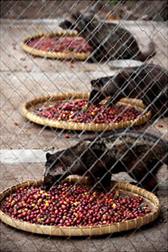Quaffee is proud to be associated with the specialty coffee industry and is proud to be ethical. For this reason, we do NOT, and will NOT supply what has essentially become a gimmick of coffee pundits and so-called aficionados. Often referred to as:
- Kopi luwak
- Weasel coffee
- The coffee in the bucket list movie
- cat coffee
- poo coffee
- civet coffee
To name a few.

So why do we not do it?
Why is it so famous
After the Dutch took coffee to Indonesia and planted it there, they found that a local civet, the palm civet (or Luwak as and the locals called it), was eating the ripe coffee cherries. After initially trying to get rid of the “pests”, they then found that the civet poo contained the pips or the green coffee beans. After cleaning the poo they identified that the coffee bean was fully intact, the rest is history, as the stories spread.
And then…
The fame spread. Since the Luwak was wild, it ate many things besides the ripe coffee cherry. Running around the wild forests near the coffee plantations, they defecated all over the place. Hence, the collection of the poos was labour intensive, and tie consuming. As a result, the price of Kopi Luwak coffee increased.
However, with the higher price more unscrupulous people became interested in making a quick buck. So, Luwaks where caught breed and essentially. So it is easier to farm their secretion of the coffee pip.
Currently:
- Only coffee cherries are fed to the captured Luwaks. Hence, their diet is not as diverse as it used to be. Add to that is the fact that ripeness of the cherries is in question. And so too is their quality.
- The Luwak is kept in elevated cages, to allow the farmers to wash the defecated wasted easily down into drains. From there they are collected cleaned and then sold as the original Kopi Luwak.
- The other way they are farmed is that the Luwak’s stomach acid is extracted (the civet needs to be dead to do this) and is used in the fermentation of the coffee cherry, which then produces the coffee beans.
So either way these are not ethical, and hence goes against one of our core philosophy of being conscious and environmentally friendly in all aspects that we can.
One other thing worth noting is that Robusta (the lowest quality coffee) is often fed to the civets and hence the coffee of origin, is of poor quality to start off with.
What does it taste like?
We were fortunate enough to work with Yada Coffee (now defunct) who work with anti-human trafficking in Indonesia. One of the villages they work with, we were trying to source coffee from. The farmer there had real Kopi Luwak. What that means is that he and his pickers physically search their coffee plantations for civet poo. Excretions with coffee in are easy to spot. Once found they process it themselves (wash them a lot). We were provided a small lot to try. We roasted this and tried it and shared with our fellow coffee roasters.
The coffee has a rich mouthfeel and some spicy overtones. Was it the best coffee we ever tasted, not close! It was good coffee and if we had been able to convince other South African based roasteries to join us in the import we would have looked at offering the coffee. We got no genuine interest and hence could not offer it. The pricing we would have been able to secure the coffee at is around $12/pound, which makes it around the same price as some of the limited-edition coffees we have offered. The Cup of Excellent (CoE) and other auction coffees are a lot more. And these coffees have a high level of transparency, where you can trace the coffee back to the actual picking area. The CoE coffees (which we offer on occasion) have a much better cup quality.
Here is a brief video of the event:
Yes but so-and-so say they have the real thing
Do they? If a roaster is claiming it has the real thing ask for their transparency information. Which Island in Indonesia does it come from? Is it from a single producer? Most producers in Indonesia are small having farms less than 3 hectares. If they cannot provide that the watch the doccie above. Be conscious in what you consume, and you will be rewarded.
Watch this…
Our World Coffees’ Cruel Secret – Kopi Luwak, by the BBC.
Read more…
Here are some other links about the cruel practice of farming Kopi Luwak:
- Civets Suffering for Cruel Coffee – PETA.
- From the famous Care2 website Stink over plans to farm civet cats, originally here…
- The Straight Dope.
- What’s wrong with this picture
- From the Guardian: World’s most expensive coffee tainted by ‘horrific’ civet abuse
- From Plus Point cut the crap stop selling civet coffee

